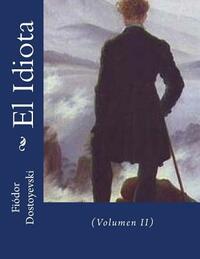You need to sign in or sign up before continuing.
Take a photo of a barcode or cover
Uno de los mejores libros que me he leído en mucho tiempo
Po nadšení zo Zločinu a trestu som neodolal a rovno som sa pustil do Idiota. Dostojevskij vo svojich zápiskoch poznamenal, že Idiota písal bez vopred určenej štruktúry a takpovediac sa nechal unášať správaním a rozhodnutiami samotných postáv. Ak toto nesvedčí o tom, že to bol literárny génius, tak asi už nič.
V Idiotovi sa stretávame s väčším množstvom postáv než v Zločine a treste, obsadenie sa väčšmi ponáša na Bratov Karamazovovcov. Všetci sú medzi sebou prepletení a v priebehu niekoľkých hodín po príchode kniežaťa Myškina na scénu každá z postáv zaujme svoju pozíciu na šachovnici a čaká na ďalší ťah. Rozpúta sa hra plná úskokov a zrady, ale aj ľudskej náklonnosti a spolupatričnosti.
Dostojevskij je nespochybniteľným majstrom v psychológii postáv a v prezentovaní morálnej dilemy. V Idiotovi sa ponoril do tém smrti, cti, katolíckej viery či spoločenského postavenia. S adekvátnou dávkou pokory sa stavím, že na svete naozaj neexistuje nikto, kto píše ako Dostojevskij. Jeho knihy sú jedinečné, miestami poburujúce, revolučné a za mňa v dobrom slova zmysle aj podpichovačné.
Význam literárnej klasiky vidím v tom, že nás núti premýšľať o nesmrteľných témach. Nech už sa v politike deje hocičo, isté témy budú ľudstvo trápiť vždy a na určité otázky asi nikdy nenájdeme exaktné odpovede. Klasická literatúra nám ale pomáha vo vytváraní názoru a snáď nás vedie aj k tomu, aby sme zdravo spochybnili svoje doterajšie presvedčenie.
V Idiotovi sa stretávame s väčším množstvom postáv než v Zločine a treste, obsadenie sa väčšmi ponáša na Bratov Karamazovovcov. Všetci sú medzi sebou prepletení a v priebehu niekoľkých hodín po príchode kniežaťa Myškina na scénu každá z postáv zaujme svoju pozíciu na šachovnici a čaká na ďalší ťah. Rozpúta sa hra plná úskokov a zrady, ale aj ľudskej náklonnosti a spolupatričnosti.
Dostojevskij je nespochybniteľným majstrom v psychológii postáv a v prezentovaní morálnej dilemy. V Idiotovi sa ponoril do tém smrti, cti, katolíckej viery či spoločenského postavenia. S adekvátnou dávkou pokory sa stavím, že na svete naozaj neexistuje nikto, kto píše ako Dostojevskij. Jeho knihy sú jedinečné, miestami poburujúce, revolučné a za mňa v dobrom slova zmysle aj podpichovačné.
Význam literárnej klasiky vidím v tom, že nás núti premýšľať o nesmrteľných témach. Nech už sa v politike deje hocičo, isté témy budú ľudstvo trápiť vždy a na určité otázky asi nikdy nenájdeme exaktné odpovede. Klasická literatúra nám ale pomáha vo vytváraní názoru a snáď nás vedie aj k tomu, aby sme zdravo spochybnili svoje doterajšie presvedčenie.
This was a really tough read for me. It felt like Dostoyevsky had come up with the idea for the Prince's character one day - which, in itself, is fascinating indeed - but then failed to create an equally interesting world around him. The other characters in the book were dull and flat (excepting maybe Hyppolite), and the story just lacked the complexity it would have deserved. I was waiting for things to come together but they never did and the book could never keep my attention for more than an hour at a time. It's a shame because the premise really appealed to me initially and the Prince's character was immensely intriguing.
challenging
reflective
slow-paced
Plot or Character Driven:
A mix
Strong character development:
No
Loveable characters:
Complicated
Diverse cast of characters:
No
Flaws of characters a main focus:
Yes
This book was a bit of a struggle. I generally enjoy 19th-century classics, but with The Idiot it was a matter of perseverance to get the (albeit unexpected) end. There are endless similar scenes of groups of people sitting in drawing rooms having similar conversations and the conversations are not always so interesting. I was happy to reach the end.
This book was a trudge at times to get through, but the ending makes it all worth it. There are about 5 parts of the book that I found particularly exciting and which had me turning pages quickly to see what happens next. The last three or four chapters were especially like this. The story is so long and the themes complex, and I like to think that Dostoevsky brings it all to a climax and close in the final scene, even though I don't understand it all yet.
I still have much more of this book to simply think through, but at this point I am left with at least one take-away: life and death would have no meaning without resurrection (Nastasya means resurrection). What meaning does your life have when you have 3 minutes to live before you are executed? when you have two weeks to live until your illness overcomes you? What about right now, since you know not how or when but only that you will die? Is there a difference? Ippolit asks how could the disciples believe, looking at the perfectly dead corpse of the man Jesus, "that this sufferer would resurrect?" And Myshkin observes that such a sight can cause a man to lose his faith. This book doesn't answer the question, but instead steeps the reader in the existential darkness of the tomb of Holy Saturday and allows--indeed, obliges--the reader to answer for him/herself.
I still have much more of this book to simply think through, but at this point I am left with at least one take-away: life and death would have no meaning without resurrection (Nastasya means resurrection). What meaning does your life have when you have 3 minutes to live before you are executed? when you have two weeks to live until your illness overcomes you? What about right now, since you know not how or when but only that you will die? Is there a difference? Ippolit asks how could the disciples believe, looking at the perfectly dead corpse of the man Jesus, "that this sufferer would resurrect?" And Myshkin observes that such a sight can cause a man to lose his faith. This book doesn't answer the question, but instead steeps the reader in the existential darkness of the tomb of Holy Saturday and allows--indeed, obliges--the reader to answer for him/herself.
challenging
slow-paced
Plot or Character Driven:
Character
Strong character development:
Yes
Loveable characters:
Complicated
Diverse cast of characters:
Yes
Flaws of characters a main focus:
Yes





